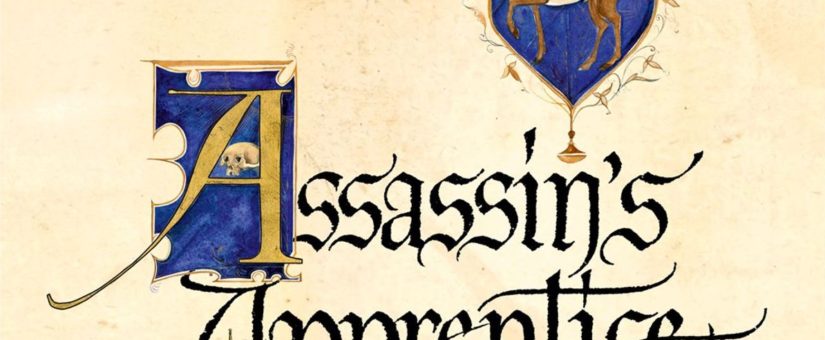
Re-reading The Farseer Trilogy: Book I, Assassin’s Apprentice
- Posted by Augur Blog
- On August 21, 2019
- 0 Comments
- Farseer trilogy, Robin Hobb
By Mado Christie
When I set out to re-read Robin Hobb’s Elderlings saga, which is undeniably one of my favourite fantasy series of all time, it wasn’t from a purely positive place. First of all, the catalyst for my urge to revisit the series was the ending of the whole series, which left me with a sour feeling in the pit of my stomach, despite being satisfying in almost every way. I talk more about that feeling in this blog post from earlier this year. I was caught between trying to understand that feeling and hoping beyond hope that I wouldn’t find any evidence to support it.
Not only was I already entering this re-read from a place of anxiety, but I also realized that the book might bring back some unpleasant memories. I didn’t think about this until I went to pick up book one, Assassin’s Apprentice, for the first time in over half a decade: I first read these books between my first and second years of university, which was a strange and difficult time in my life. I’m almost certainly not the only person who strongly associates a book with the things that were going on in my life when I read it, and I was nervous about recalling those memories once I opened the first page. Thankfully, this concern melted away as soon as the narrative pulled me in yet again.
I won’t beat around the bush anymore: I loved re-reading Assassin’s Apprentice. It was such a special experience, and I’m glad I took the plunge. There are characters in this series who are so special to me, and whose stories are so satisfying, and it was an absolute delight to be re-introduced to them at the beginning of their journeys. Imagine if you could meet your best friend all over again — that’s how I felt seeing characters like Molly Chandler and Kettricken on the page again. This was one of the first things that struck me while reading: these characters are developed to a degree that I’ve rarely seen since reading that series.
I want to take a brief moment here just to highlight how much I’ve missed re-reading books, in general. There are a few books I re-read with some regularity: His Dark Materials (Philip Pullman) and Emma and Pride and Prejudice (Jane Austen) among them. But I know those books so well that I’ve almost memorized them. Getting caught up in the online book community, which tends to prioritize new and forthcoming releases, means that I haven’t re-read a less familiar book in quite a long time. I definitely want to do it more often.
I was concerned going in that the love would have faded, like with any favourite thing from a previous season in life. I’ve always maintained that Robin Hobb’s prose is some of the best in fantasy, and I was worried that it wouldn’t hold up. I’m thrilled to report that it absolutely DID hold up. Not only in comparison to the “bad” fantasy I was reading back then, but also to the excellent fantasy/scifi that I’ve read since from authors like Naomi Novik and N.K. Jemisin.
I had also forgotten how much I love Hobb’s style of pacing. It’s slow, but somehow still gripping. This is not an action-packed book by any stretch of the imagination. At the same time, I’m always astonished by how quickly I can get through her books. The details make the world all the more real, and the story builds upon itself like a really intelligent thriller. Even though I know where the story eventually leads, I would still get caught up in the tension, wondering what exactly came next.
The thing that I loved most, though, was the relationships. Fitzchivalry Farseer is a fully realized character, to be sure, but it’s his relationships to the characters around him that make this book so complex. I knew that Fitz didn’t have an easy life, but I’d forgotten how difficult his circumstances are right from the beginning of the series. Even Chade, the titular assassin who takes Fitz on as a student, doesn’t fall into the category of caring mentor. The road ahead of this angsty main character is long and rough, but at least it will never be boring. He has no shortage of antagonists, ranging from the petty to the life-threatening. Poor Fitz.
One of my main reasons for going back into this series was following the development of Fitz’s relationship with the Fool, a genderqueer character who plays an important role in his life. In contrast, I was surprised to find that the Fool doesn’t play a huge role in this book. He’s there, and any reader can tell that the relationship between him and Fitz is one to keep an eye on, but he’s definitely in the background for most of the book. I look forward to watching him emerge in the following books in the trilogy and the series beyond.
All in all, I’m really glad I decided to do this. I’m also a lot less daunted than I was when I first contemplated tackling a series re-read. I’m excited to see what else I’ll discover along the way.
Up next: book two, Royal Assassin.




0 Comments